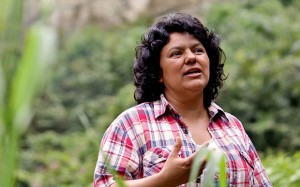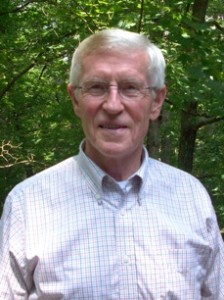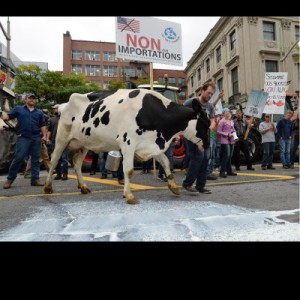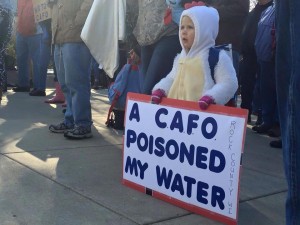Lisa Haugaard, Executive Director, Latin America Working Group
[email protected]
Over 200 human rights, faith, indigenous rights, environmental, labor, and nongovernmental groups sent an open letter to Secretary of State Kerry expressing “shock and deep sorrow regarding the murder of Honduran human rights and environmental defender Berta Cáceres,” the founder and general secretary of the Civic Council of Popular and Indigenous Organizations of Honduras (COPINH). The organizations urged “a response from the State Department that is not business as usual but a profound change of direction towards improving the abysmal situation of human rights in Honduras.”
Berta Cáceres, winner of the prestigious 2015 Goldman Environmental Prize, was a visionary indigenous and environmental rights leader. She championed efforts to protect indigenous peoples from large-scale development projects that are being advanced in Honduras without consultation of communities and without concern for the environment. She was killed on March 3, 2016 by armed men who broke into her home in La Esperanza, department of Intibucá, Honduras. Mexican environmentalist and journalist Gustavo Castro Soto of Otros Mundos Chiapas/Friends of the Earth Mexico and the Mesoamerican Movement against the Extractive Mining Movement was also wounded in the attack.
The organizations urged Secretary of State Kerry to support an independent international investigation led by the Inter-American Commission on Human Rights into Ms. Cáceres’ murder and to urge that the Honduran government invite and fully cooperate with such an investigation. They also urged the Secretary to press the Honduran government to comply with the precautionary measures granted by the IACHR on March 5 and provide immediate, effective, and carefully consulted protection to members of COPINH, members of Ms. Cáceres’ family, Mr. Castro and all witnesses in the case.
Finally, the organizations urge the State Department “to suspend all assistance and training to Honduran security forces, with the exception of investigatory and forensic assistance to the police, so long as the murders of Berta Cáceres and scores of other Honduran activists remain in impunity.”
An Open Letter to Secretary of State John Kerry regarding the Murder of Honduran Indigenous and Environmental Activist Berta Cáceres
We write in shock and deep sorrow regarding the murder of Honduran human rights and environmental defender Berta Cáceres, founder and general secretary of the Civic Council of Popular and Indigenous Organizations of Honduras (COPINH). We urge a response from the State Department that is not business as usual but a profound change of direction towards improving the abysmal situation of human rights in Honduras.
Berta Cáceres, winner of the prestigious 2015 Goldman Environmental Prize, was a visionary indigenous and environmental rights leader. She championed efforts to protect indigenous peoples from large-scale development projects that are being advanced in Honduras without consultation of communities and without concern for the environment. She organized communities in Honduras and across the world against the unconsented extraction of natural resources and in defense of the Gualcarque River, a sacred site of the Lenca people and an essential water source, against the construction of the Agua Zarca hydroelectric dam. Berta Cáceres was a much-loved leader of the diverse social movements in her country. Members of Honduran civil society are united in sorrow and anger about her death—as are so many in the international community.
Berta Cáceres was killed on March 3, 2016 by armed men who broke into her home in La Esperanza, department of Intibucá, Honduras. Mexican environmentalist and journalist Gustavo Castro Soto of Otros Mundos Chiapas/Friends of the Earth Mexico and the Mesoamerican Movement against the Extractive Mining Movement was also wounded in the attack. We urge that Mr. Castro immediately be permitted to return safely to his country.
In the course of her work, Berta Cáceres suffered constant death threats against herself and her family, threats of sexual violence and assault, attacks and harassment. She was also the subject of continual legal harassment by judicial authorities and intimidation by security forces and local government officials for her work. In the six months before her murder, according to COPINH, the threats against her escalated and included shots fired at her car and verbal threats and messages, by members of the military, police, local authorities and representatives of the hydroelectric company.
Ms. Cáceres had precautionary measures from the Inter-American Commission on Human Rights (IACHR) since 2009 but never received the full protection she needed. We are outraged by statements from Security Minister Julián Pacheco that in effect blame Cáceres for the failure of the Honduran government to comply with its obligation to protect her. She is one of 15 human rights defenders who have been killed in Honduras while beneficiaries of IACHR precautionary measures, as reported by the Committee of Relatives of the Disappeared in Honduras (COFADEH). On March 5, 2016, the IACHR granted precautionary measures for COPINH, Berta Cáceres’ family and Gustavo Castro Soto, given the risk to their safety.
Berta Cáceres’ death confirms what a 2015 report by Global Witness has shown: Honduras is one of the world’s most dangerous countries for environmental activists. At least 109 environmental activists were murdered between 2010 and 2015. Since the 2009 coup, Honduras has become one of the world’s most dangerous places to be a human rights defender of any kind. Indigenous and Garifuna leaders, LGBTI activists, union leaders, women’s rights activists, human rights activists, justice operators, and journalists reporting on human rights and corruption issues are among those who, like environmental activists, are at risk. The murder of Berta Cáceres sends a devastating message to all Hondurans trying to exercise their rights.
We urge you:
- To support an independent international investigation led by the Inter-American Commission on Human Rights into Ms. Cáceres’ murder and to urge that the Honduran government invite and fully cooperate with such an investigation. Such an independent investigation is essential given the lack of confidence in the judicial system; reigning impunity, including for cases involving human rights defenders; and the emblematic nature of this case.
- To insist that Honduran judicial authorities carry out their duties to effectively and promptly investigate Cáceres’ murder, in cooperation with the international investigation, and following lines of inquiry that take into account the context of Cáceres’ work and situation of risk and pursue the intellectual as well as material authors, guaranteeing due process and access to justice.
- To press the Honduran government to comply with the precautionary measures granted by the IACHR on March 5 and provide immediate, effective, and carefully consulted protection to members of COPINH, members of Ms. Cáceres’ family, Mr. Castro and all witnesses in the case.
It is crucial that the Honduran government meet, as the IACHR has said, its “obligation of carrying out the prior, free, and informed consultation of indigenous people regarding projects underway on their land and territories and that affect their natural resources.” We support Senator Patrick Leahy’s call to abandon the Agua Zarca dam project and to protect the territory that Berta devoted her life to defending. The Honduran government should recognize that the pace and process by which it is facilitating the extraction and trade of natural resources by national and international investors is contributing to social conflict and human rights violations.
We ask the U.S. government to:
- urge the Honduran government to meet its obligation to ensure prior, free, and informed consent of indigenous communities and to greatly improve transparency regarding existing and proposed concessions of natural resources. This should include making public project information regarding the nearly 50 hydropower concessions granted since the start of 2010.
- ensure that no U.S. assistance and support for multilateral bank projects promote or permit development projects without meeting the obligation for ensuring prior, free and informed consent of indigenous communities, nor without ensuring meaningful consultation of all affected communities and that strong human rights, labor rights and environmental safeguards are in place.
The U.S. government must stand with those who are putting their lives on the line for the protection of human rights and the environment in Honduras.
Signed by:
Accountability Counsel
ActionAid USA
Alabama Center for Rural Enterprise
Alabama Coalition for Immigrant Justice (ACIJ)
Alianza Americas
Alliance Against Mining – Philippines (Alyansa Tigil Mina)
Alliance for Global Justice (AfGJ)
Alliance for Justice
Amazon Watch
AMERICA PARA TODOS
American Federation of Labor and Congress of Industrial Organizations (AFL-CIO)
American Friends Service Committee (AFSC)
American Jewish World Service (AJWS)
Amigos de la Tierra España
ART NOT WAR
Azul
Baurkot & Baurkot
Beautiful Trouble
Beautiful Rising
Beyond Extreme Energy
Brooklyn For Peace
Casa de Maryland
Catholics in Alliance for the Common Good
Center for Biological Diversity
Center for Earth Ethics at Union Theological Seminary
Center for Human Rights and Environment
Center for International Environmental Law (CIEL)
Center for Justice and Accountability (CJA)
Center for Justice and International Law (CEJIL)
Center for Women’s Global Leadership, Rutgers University
Center of Concern
Center on Conscience & War, Washington DC
Central American Resource Center (CRECEN)
Central American Resource Center (CARECEN), Washington DC, Los Angeles, and San Francisco
Centro de Documentación en Derechos Humanos “Segundo Montes Mozo S.J.” (CSMM)
Centro de Estudios para la Justicia Social TIERRA DIGNA, Colombia
Chicago Religious Leadership Network on Latin America (CRLN)
Christian Church (Disciples of Christ), Refugee and Immigration Ministries
Church World Service
Climate Parents
Coalition of Black Trade Unionists (CBTU)
CODEPINK
Colombia Support Network
Columban Center for Advocacy and Outreach
Columbia Divest for Climate Justice
Committee in Solidarity with the People of El Salvador (CISPES)
Committee for Human Rights in Latin America (CDHAL), Montreal, Canada
Committee on U.S.-Latin American Relations, Cornell University
Communications Workers of America (CWA)
Community Alliance for Global Justice (CAGJ)
Community Justice Project, Inc. of Miami, FL
Conference of Major Superiors of Men
Corporate Accountability International
The Cross Border Network for Justice & Solidarity, Kansas City, Missouri
Denver Justice & Peace Committee
Disciples Justice Action Network
Divest Middlebury
Dominican Friars, Irving, TEXAS
Donella Meadows Institute
Due Process of Law Foundation
EcoEquity
EarthAction International
Earth Day Network
Earthjustice
Environmental Defender Law Center (EDLC)
Environmental Defenders Project, USA
Environmental Investigation Agency (EIA)
Environmental Rights Action/Friends of the Earth Nigeria
Evangelical Lutheran Church in America (ELCA)
Faith in Public Life
Family Farm Defenders
Farmworker Association of Florida
The Fellowship of Reconciliation
FERN
Florida Immigrant Coalition
France Amérique Latine/Francia América Latina
Franciscan Action Network
Friends Committee on National Legislation
Friends of the Earth-United States
Friends of Miami-Dade Detainees
Food First
Food Voices
Fund for Democratic Communities, Greensboro, NC
Georgia Detention Watch
Global Alliance for the Rights of Nature
Global Campaign for Peace Education
Global Ministries of the Christian Church (Disciples of Christ) and United Church of Christ
Global Witness
Goldman Environmental Foundation
Grassroots Global Justice Alliance
Grassroots International
Green America
Green Cross International
GreenLatinos
Greenpeace USA
GreenWood
Grupo Belga ‘Solidair met Guatemala’
Guatemala Human Rights Commission (GHRC)
The Guatemalan-Maya Center
Gulf Coast Center for Law & Policy
Honduran Conservation Coalition
Honduras Accompaniment Project
Hondurasdelegation, Germany
Honor the Earth
Hope Community Center
IBIS
Ignatian Solidarity Network
Indigenous Environmental Network
The Ingrid Washinawatok Flying Eagle Woman Fund for Peace, Justice and Sovereignty
Institute for Agriculture and Trade Policy
Institute for Justice & Democracy in Haiti
Institute for Policy Studies, Climate Policy Program, Global Economy Project and New Economy Maryland Project
Interamerican Association for Environmental Defense (AIDA)
Interfaith Coalition on Immigration, MN
Interfaith Power & Light
International Federation of Settlements
International Forum on Globalization
International Institute on Peace Education
International Labor Rights Forum (ILRF)
International Platform against Impunity
International Rivers
International Trade Union Confederation (ITUC)
International Union, United Automobile, Aerospace and Agricultural Implement Workers of America (UAW)
JA!FOE Moçambique
JASS (Just Associates)
Jesuit Conference of Canada and the United States
Jesuit Social Research Institute/Loyola University New Orleans
Just Foreign Policy
KyotoUSA
La Asamblea Veracruzana de Iniciativas y Defensa Ambiental (LAVIDA), Mexico
Labor Council for Latin American Advancement, AFL-CIO (LCLAA)
Latin America Solidarity Committee-Milwaukee
Latin America Task Force of Interfaith Council for Peace & Justice – Ann Arbor, Michigan
Latin America Working Group (LAWG)
Leadership Conference of Women Religious
LEPOCO Peace Center, Bethlehem, PA
Liberty Tree Foundation for the Democratic Revolution
Maryknoll Office for Global Concerns
Medical Mission Sisters
Mennonite Central Committee U.S. Washington Office
Missionary Oblates of Mary Immaculate-U.S Province (OMI)
Movement Generation: Justice and Ecology Project
Movimiento Mesoamericano contra el Modelo extractivo Minero -M4
MN350
Mundo Maya Foundation
National Advocacy Center of the Sisters of the Good Shepherd
National Family Farm Coalition
National Immigration Law Center
The National Religious Campaign Against Torture
Nicaragua Network
Nicaragua-US Friendship Office of the Americas
NOAH Friends of the Earth-Denmark
Nonviolence International
Nuclear Information and Resource Service
The Oakland Institute
Oil Change International
Other Worlds
Oxfam America
Pax Christi International
Pax Christi USA
Peace Action
Peace Action Montgomery
Peace Brigades International (PBI)
Peace Development Fund, Amherst, MA and San Francisco, CA
Peace Education Initiative, The University of Toledo
Pesticide Action Network North America
Plataforma Interamericana de Derechos Humanos, Democracia y Desarrollo (PIDHDD Regional)
Presbyterian Church (USA)
Presbyterian Peace Fellowship
Progressive Congress
Project South
Public Citizen
Public Services International
Radios Populares, Chicago IL
Rainforest Action Network
Red Europea de Comites Oscar Romero
Red Mexicana de Lideres y Organizaciones Migrantes
Rights Action (USA)
Robert F. Kennedy Human Rights
RootsAction.org
The Rural Coalition
Sansristi India
The Second Chance Foundation
SEIU Florida Public Services Union
Servicios Internacionales Cristianos de Solidaridad con los Pueblos de America Latina — Oscar Romero (SICSAL)
Sierra Club
Sister Parish, Inc.
Sisters of Mercy, Institute Justice Team
Sisters of Notre Dame de Namur Justice and Peace Office
Sojourners
The Solidarity Center
SomeOfUs
SOMO (Centre for Research on Multinational Corporations), Netherlands
Soulardarity
Southeast Immigrant Rights Network (SEIRN)
South Florida Interfaith Worker Justice
Student Power Networks
SustainUS
Syracuse Peace Council
Tamales y Bicicletas
Task Force on the Americas
Trade Union Confederation of the Americas (TUCA)
Tri-Valley CAREs (Communities Against a Radioactive Environment)
Trócaire
Unión de Afectados por Texaco, Ecuador (UDAPT)
Unitarian Universalist Service Committee (UUSC)
United Auto Workers Union (UAW)
United Church of Christ, Justice and Witness Ministries
The United Methodist Church – General Board of Church and Society
UPROSE
Voces de la Frontera
Washington Defender Association Immigration Project (WDAIP), Seattle, WA
Washington Office on Latin America (WOLA)
WE ACT
Women’s Earth and Climate Action Network (WECAN)
Women’s Environment and Development Organization
World Organisation Against Torture (OMCT)
Zo Indigenous Forum, Mizoram, India
1199SEIU United Healthcare Workers East – Florida
2020 Action
350.org
Desmond D’Sa, Goldman Environmental Prize Winner 2014, Africa





